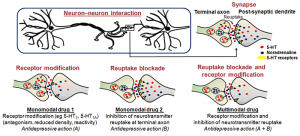Answered by John Harrison
Senior Lecturer, Co-Chair

Q1
Answered by John Harrison
A number of tests have been employed in patients with depression to determine the presence of cognitive deficits and to measure cognitive change. In the latter case, this has typically been in the context of determining whether a therapeutic intervention has been successful. The better measures of cognition are those that exhibit high levels of reliability, validity and sensitivity, particularly important when measuring cognitive change.
Full neuropsychological assessment with a trained expert remains the ‘gold standard’ for the evaluation of cognition in patients with depression. However, we understand and recognise that these services are not routinely available. For a quick assessment of cognitive difficulties, our inclination is to suggest the use of brief, easy to administer and easy to understand tests. We have selected the following cognitive tests for use in the forthcoming THINC screening tool and would recommend their use as a rapid screening assessment:
- Choice Reaction Time (CRT)
- One-Back Task (1BT)
- Digit Symbol Coding Test (DSCT)
- Trail Making Test (TMT)
CRT and 1BT require computers for their delivery. Versions of the DSCT can be obtained from Pearson, the owners of the Digit Symbol Substitution Test. The TMT is publically available. For the evaluation of cognitive change, we note that in a recent clinical drug trial a number of ‘pencil-and-paper’ and computerised measures captured significant effects of treatment on cognition.1 While traditional ‘pencil-and-paper’ assessments can assess cognitive change, we would suggest the use of computerised or computer-assisted measures, examples of which can be viewed at the CogState, CNS Vital Signs, Bracket and Cambridge Cognition websites. For further guidance on cognition test selection, see Ferris et al2 and Harrison and Maruff.3
- McIntyre RS, Lophaven S, Olsen CK. A randomized, double-blind, placebo-controlled study of vortioxetine on cognitive function in depressed adults. Int J Neuropsychopharmacol 2014; Apr 30 [Epub ahead of print].
- Ferris SH, Luca U, Mohs R, Dubois B, Wesnes K, Erzigkeit H, Geldmacher D, Bodick N. Objective psychometric tests in clinical trials of dementia drugs. Position paper from the International Working Group on Harmonization of Dementia Drug Guidelines. Alzheimer Dis Assoc Disord 1997; 11 (Suppl 3): 34-38.
- Harrison JE, Maruff P. Measuring the mind: assessing cognitive change in clinical drug trials. Expert Rev Clin Pharmacol 2008; 1: 471-473.





























